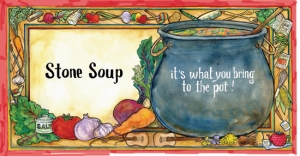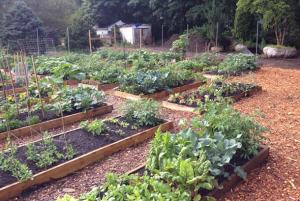Recently, I’ve been casting about searching for my path. I wanted to do something important to people, something that helped and offered a bit of positive energy to the world. You’ll forgive me if I made the error of believing that it had to be some grand and sweeping gesture, a project that took me beyond the borders of this country and to the edge of its sphere of influence. I think my heart was in the right place, but that was all wrong. Some of the most important projects have small starts, and big, positive change can begin with a single move in the right direction.
Do what you can, with what you have, where you are. ~Theodore Roosevelt
The topic of a recent post here was nutritional inequality and the modern prestige hierarchy. A colleague of mine from college read it and was moved to contact me about an idea that had been vaguely swimming in the back of her mind for years–a community garden, the intent of which would be to allow those currently reliant on TANF or SNAP funds for basic life needs to devote more dollars to better quality protein and other foods. Because they would grow many fresh vegetables themselves, they could then afford to use their federal and state assistance to purchase more nutritious foods.
I’ve been having similar vague thoughts for some time now, but alone, I was uncertain of how to frame them. Because she was similarly boggled, I thought we might be able to help each other frame the concept more clearly. Both of us have advanced degrees in anthropology, and yet both of us have struggled to find our place in the past few years. We have each confronted feelings of purposelessness and failure. Today, we met and put a more definite shape on the concept, but it’s still in a nascent phase of development. There will be much to do, many contacts to make, grants for which to apply, and strategies to formulate. This is only the beginning.
Calling on Folklore to Bring About Change
I came up with the name The Stone Soup Initiative, because the old story, once heard in childhood, has remained with me. I’ll post a link to a Portuguese folktale for those of you interested in revisiting the story:
http://www.dltk-teach.com/fables/stonesoup/mtale.htm
Essentially, the core moral is that a community working together accomplishes goals that are impossible for a single individual. As well, when people are willing to give even a small, individual contribution to a larger effort, they improve the outcome. The whole is greater than the sum of the parts, but each part brings a unique attribute to the overall aspect.
The roughed out concept that we settled upon is a community project garden and educational program, centering on reclaiming their nutritional agency, utilizing local or indigenous foods, and the underlying politics of food availability. The concept is far from new, but we would like to draw upon the wisdom of established programs, as well as improve aspects that may have detracted from success of similar initiatives.
We are both well aware that this plan will need significant investment on our part in terms of research, grant writing, creating partnerships in the local academic and social justice communities, and lots of figuring out stuff we never thought about before. There’s a lot of road left, but we’ve taken the first step, which is to identify our project.
The Broader Scope
We would like to include professionals and students interested in bringing their knowledge to the endeavor. As well, we both know how valuable partnerships with local social action groups, community service initiatives, and the communities themselves will prove. The purpose of our plan is to produce a highly replicable template for garden programs that can be adopted and spread wherever there is need for augmented nutrition. This is not about fame and glory for us, but about using our intelligence and our training to enact positive change.
I don’t think I’m alone in being utterly aghast at the level of inequality I see, nor in making the connection that food is used as a political weapon to reenforce social injustice–unequal opportunity, unequal access to appropriate nutrition, education, and jobs that pay enough to free people from the cycle of social assistance programs. Nor do I think I am the only one who sees that these programs and the surrounding social structures reinforce a subtle victim psychology in those who are forced by circumstances to apply for them, which feeds the problem, rather than helping them to feel self-sufficient, productive, and worthwhile.
That’s a big part of this project that is slowly coming into focus–instilling a feeling of ownership, the satisfaction of having something to show for effort. I suggested that we model the community garden after a sort of corporate body–people “invest” through giving time to growing the foods, and receive “shares” in the company. I’m going to have to do a great deal more research, and figure out precisely what that will entail, but I really like the idea of everyone who benefits from the garden having a stake in it, too. Children, the elderly, moms, dads, uncles, and aunts–or even youths who might have strayed into dangerous pastimes. I know how good I feel to see something I’ve planted flourish and bear fruit, and I’d like to pass that on to people everywhere.
Over the next year or so, I do plan to post updates, talk about the process, and discuss the challenges I will doubtless come up against in this journey. What I will ask of everyone who feels strongly that the way things are is not how they should continue to be, is to share these updates with their social and professional circles. Please offer constructive critique and feedback. I welcome that. But don’t tell me, based on this first entry, that I am trying to do the impossible, that I’m idealistic and have no grasp on “reality.”
I’ve come to the conclusion that we need more than one healthy dose of idealism to survive in this world, body and mind. Reality is grim because we stamp out the spark of the beautiful and the hopeful. Stone Soup–together, I believe we can shift the balance of inequality and provide nutrition, hope, and initiative to succeed for many. We have to begin somewhere.


I love this idea! Best wishes on this wonderful project. 😀
LikeLiked by 1 person
Thank you. It’s huge and has lots of moving parts, but I’m excited about it.
LikeLiked by 1 person
This idea of Stone Soup is amazing. The sence of accomplishment will be wondrous to all like me and everyone that has ever felt defeated and perpertuated by the system, per say. Everyone has struggles and demons that block accomplishments. What a wonderful institution and ideal. Yes this will be quite the endevour to set into motion, but uniting all in every corner, this can be done! Change starts with small steps and everyone would relish the chance to cultivate a chance for a better life.
LikeLike
OK.. on computer now. There is nothing wrong with idealism and what you are proposing is something doable and realistic. This is so cool Erin. I think one of the biggest challenges will be getting people engaged who are used to, or better yet, content with dependence. I speak of this through personal experience or knowledge of some who needed nudging. My idealistic self thinks that might be a low percentage of people but often those are the ones who need help and guicance the most. I would think once you have resources and logistics in place, most will jump at this opportunity both from the needy pool and the volunteer pool. Teach a man to fish…. 🙂
LikeLiked by 1 person
I see a lot of politicians passing laws that belittle those in need of help–calling them dirty, worthless, criminal burdens on society. That only makes the problem worse, and it takes a heavy psychological toll on people. They start to believe it after a while, and get stuck in survival mode. I know how this feels.
My biggest challenge with this idea thus far is I don’t know what I should do first–approach communities, mock up a business plan of sorts that outlines potential costs if all goods and labor are paid for at the going rate, apply for grants? Which duck gets put up front?
As of now, I’m still reading the available data–guidelines, experiences of those who’ve done this, and trying to figure out the shape it will take.
I want this to be a suburban project–there are quite a few gardens in Atlanta and the built up areas nearby. But the face of poverty has changed in the last decade, and suburban communities in need are more prevalent than ever.
Because we’re still stuck in this old mode of conceptualizing poor people as living in the city centers, with only affluent families in the suburbs, a great many of those in need are denied access to these projects, simply because they’re too far away.
LikeLiked by 1 person
Sometimes funding can be received from people or groups that already raise money for worthy community causes. Example: I sit on an education impact council for United Way. We review numerous proposals from various organizations and award money each years to those that meet our core goals. Some proposals are put together by people who have backgrounds in writing grant proposals and some are not and our panel of volunteers recognize both but weigh substance versus flash. What’s unique about UW approach is they have pet programs they support and finance each year. The remainder of raised funds are spit between three catagories – Health, Finance, and Education. Your project, my dear could easily fall under Health or Finance.
LikeLike
Reblogged this on Being Southern Somewhere Else and commented:
This is from my other blog, which, while connected for me, may not appear so to others. Have a look. I’ll link future Stone Soup updated this way I the future. Yes, I am looking for interest and feedback. 🙂
LikeLike